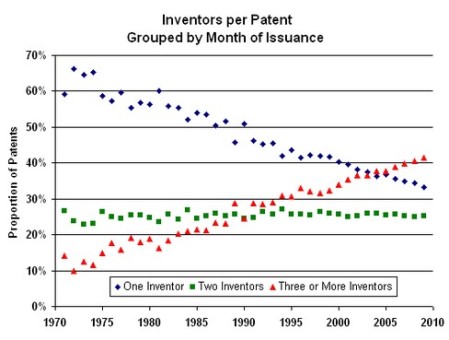Join IPEngine for a free Webinar at 1 p.m. EDT on Tuesday, September 22, 2009. We have assemble a great panel of leading IP thinkers to discuss the latest trends in monetizing IP. Click here for more information.
Patent Appeals on the Rise and Charging By the Page
July 8, 2009While patent filings may be down, appeals are up. Law.com offers an explanation:
According to the NLJ, patent challenges at the Patent and Trademark Office are up 70 percent this fiscal year, which began last October. The reason for the increase, say some IP lawyers, are stingier approval rates of patents at the PTO. This fiscal year only 44 percent of patents have been approved, compared to 66 percent five years ago. It’s no accident, according to lawyers who say that the agency’s inclination is to curtail the growth of patents.
The article also aserts that this appellate work offers a lucrative alternative alternative for patent lawyers and highlights an unusual alternative billing practice–charging by the page:
…appeals can run from $6,000 to $20,000. Craig Opperman of Reed Smith says that his firm charges $600 per page of an appeal brief.
This trend underscores the importance of being nimble in private practice. As work patterns change, it is important to take note and to adjust your marketing. In other words, instead of fighting for a slice of a shrinking pie, try some other desserts.
At the same time, it is not clear how charging by the page eliminates the uncertainty that comes with hourly billing or how it creates any incentives for counsel to be more efficient (two driving factors for in-house counsel who are looking for billing alternatives). True alternatives offer in-house counsel a fixed price (albeit with some contingencies built in).
Trolling Without Suing
June 25, 2009One of the largest patent aggregators has amassed a portfolio of over 27,000 patents. But it hasn’t filed a single law suit in order to monetize its holdings. Rather, it describes itself as a troll repellent.
25,000 New Jobs for IP Professionals in India?
June 24, 2009 That’s one prediction:
That’s one prediction:
“We expect that over 25,000 jobs for Intellectual Property professionals will be created in the next 2-3 years. As there is an increase in the need for IP professionals in law firms, knowledge and legal process outsourcing companies and other corporate houses,” said, Atulya Nath, CEO, Global Institute of Intellectual Property.
I’m not sure this prediction has concrete data behind it (I’ve already commented on this problem here.) And the CEO of a school that trains IP professionals does have some bias. Nonetheless, the IP job market does seem poised for growth in both the domestic Indian legal market (as IP enforcement becomes more prevelant) and in the ranks of LPOs that support US and UK IP work.
Fighting Off the Trolls
June 22, 2009Corporations do not like fighting off claims made by NPEs that assert patent infringement. It’s a nuisance and it is expensive.
While troll behavior is hard to stop (under our current patent system, there is no requirement that you build an invention simply because you own the rights to do so), penalizing law firms who represent these individuals may be the way to go. Under such a proposal, corporations would take away other forms of legal work from firms that represent NPEs.
USPTO Responsible for Economic Crisis?
June 12, 2009Well maybe in part (at least according to a frequent critic of the USPTO). Gene Quinn, who writes the popular blog IP Watchdog suggests that a lack of funding and poor administration at the USPTO are responsible for a backlog of patent applications which is in turn harming innovation in the United States:
[The] primary reason innovation has not come through for us is because the Patent Office has for years held innovation hostage, refused patents, extraordinarily delayed even making a decision on patent applications, and this lead to the evaporation of venture funding for many US companies, and prevented many other companies from being able to interest those with capital because no exclusive rights had been obtained, or could be predicted in any relevant time frame.
IP Law not as Immune to Recessions as Once Thought
June 8, 2009As reported in the Boston Business Journal. Litigation seems to be less effected.
Fundamentally, IP is such an important part of the U.S. economy (in Massachusetts and beyond), that this is certainly just a brief anomaly. Maybe it was hyperbole to suggest (as was common as recently as a year ago) that IP is recession proof. Even the best athletes have slumps. But that doesn’t change the fact that America is a great innovator in the life sciences, healthcare, software, hardware and the internet. In short, IP will lead the recovery. For now, however, IP is feeling the recession just like everyone else.
Will the Supremes Limit the Scope of Patentable Subject Matter
June 1, 2009The Supreme Court has granted certiorari in Bilski v. Doll, an important case challenging the scope of patentable subject matter. For a lively discussion of whether this means the death of business method and software patents, see Patently-O. The comments on the post go both ways. Some argue that the Supremes are unlikely to take a case that they simply want to affirm and since lower courts have made it more difficult to obtain these kinds of patents, maybe this will breath new life into these two areas. Others are not so optimistic.



 Posted by Stephen Seckler
Posted by Stephen Seckler  As
As